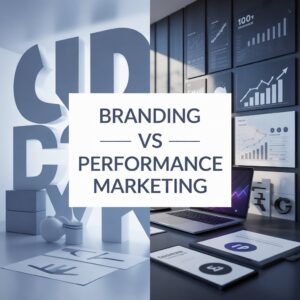In today’s digital world, every business is competing for attention online. For brands to stand out, they need a solid strategy to drive traffic, engage users, and convert leads into customers. That’s where SEO vs. SEM comes into play. Both are essential aspects of online marketing, but they work differently and serve different purposes. If you’re wondering which is the right approach for your business, this guide will help you understand the key differences and how to choose the best option.
What is SEO?
SEO, or Search Engine Optimization, is the practice of optimizing your website to rank higher in search engine results pages (SERPs). The main goal of SEO is to attract organic (unpaid) traffic from users searching for information, products, or services related to your business.
SEO involves several elements:
- On-Page SEO: This includes optimizing your website’s content, keywords, meta tags, headers, and internal linking structure.
- Off-Page SEO: Activities like backlink building and social sharing that improve your website’s authority and ranking.
- Technical SEO: Ensuring your website is fast, mobile-friendly, and easy for search engines to crawl and index.
The main advantage of SEO is its long-term effectiveness. Once your website is well-optimized and ranks high in search results, it can continue to attract visitors for a long time without additional costs.
What is SEM?
SEM, or Search Engine Marketing, refers to paid strategies used to increase visibility on search engine results pages. SEM primarily involves pay-per-click (PPC) advertising, where businesses pay to have their ads appear at the top of search results for specific keywords.
SEM includes:
- Google Ads: The most popular SEM platform, where businesses can bid on keywords and display ads when users search for those terms.
- Bing Ads: Another search engine advertising platform, which works similarly to Google Ads.
- Display Advertising: SEM can also involve placing banner ads on websites across the internet.
Unlike SEO, SEM delivers immediate results. As soon as you launch a paid campaign, your ads appear in search results, driving traffic to your website quickly. However, it requires a continuous budget, as traffic stops when your ad spend stops.
Key Differences Between SEO vs. SEM

Though both SEO and SEM aim to improve your website’s visibility in search engines, they differ in several critical ways:
- Cost:
- SEO focuses on organic traffic, which is free, but it takes time and effort to see results.
- SEM relies on paid ads, meaning you have to budget for it. However, the results are immediate.
- Time:
- SEO is a long-term strategy. It can take months to see significant results, but once you rank high, the traffic is consistent.
- SEM provides instant visibility as long as you’re willing to pay for ads, making it a great short-term solution.
- Sustainability:
- SEO offers long-lasting results. Once you rank organically, you maintain that position for a while without continuous spending.
- SEM requires ongoing investment. As soon as your budget runs out, your ads disappear, and so does the traffic.
- Credibility:
- Organic search results from SEO are seen as more trustworthy by users, since they aren’t labeled as “ads.”
- SEM ads are clearly marked as paid, which some users may avoid, even if they appear at the top of search results.
- Click-Through Rates (CTR):
- SEO generally has higher CTR in the long run, as users tend to trust organic listings more.
- SEM can deliver higher CTRs in the short term, especially if your ads are well-targeted.
Which Strategy is Right for Your Business?
Deciding between SEO vs. SEM depends on your business goals, timeline, and budget. Here’s a breakdown to help you make the right decision:
- If you’re looking for immediate results, SEM is your best bet. Paid advertising is great if you’re launching a new product, running a limited-time offer, or need quick traffic to your website.
- If you want sustainable, long-term traffic, invest in SEO. While it takes time to see results, the long-term benefits of organic search rankings far outweigh the initial effort.
- For businesses with limited budgets, SEO is often the best choice. It’s cost-effective in the long run because you don’t have to pay for every click.
- If your industry is highly competitive, a combination of both SEO and SEM can yield the best results. By leveraging the immediate benefits of SEM and building your long-term SEO strategy, you can dominate search results from both angles.
How SEO and SEM Work Together
While SEO vs. SEM are often seen as competing strategies, they can actually complement each other. Many businesses use both approaches to maximize their online visibility.
For example:
- Start with SEM: When launching a new business or product, SEM can help you gain quick traction while you build up your SEO efforts.
- Switch to SEO: Over time, as your SEO improves, you can reduce your SEM budget or focus on keywords that SEO hasn’t yet captured.
- Use data from SEM: PPC ads can provide valuable insights into which keywords convert the best. You can use this information to refine your SEO strategy.
Choosing the Best Keywords for SEO vs. SEM
Whether you choose SEO, SEM, or both, keyword research is crucial. The success of your strategy depends on targeting the right keywords. Here’s how to do it:
- SEO Keyword Research: Focus on long-tail keywords that match user intent. These tend to have less competition and higher conversion rates.
- SEM Keyword Research: Identify high-converting keywords that you can afford to bid on. Use tools like Google Ads Keyword Planner to find keywords with a good balance between competition and cost.
Remember, the right keywords will help you rank higher, increase traffic, and improve your overall online presence, whether you use SEO, SEM, or both.
Suggested: The Importance of SEO for Local Businesses in Haldwani
Conclusion: SEO vs. SEM for Your Business
In the end, the choice between SEO vs. SEM depends on your business needs. If you’re in it for the long haul and want sustainable growth, SEO is the way to go. If you need quick results and are willing to invest in paid ads, SEM is the better option. For the best results, many businesses find that a combination of both strategies provides the most comprehensive solution for growth.
At DigiPhlox, we specialize in crafting personalized SEO and SEM strategies that help businesses thrive. Our experts can help you determine the right balance of organic and paid tactics to maximize your online presence.
To stay updated with the latest tips and insights on building a strong online presence, follow us on our social media channels.
Let’s make your digital presence unstoppable!











